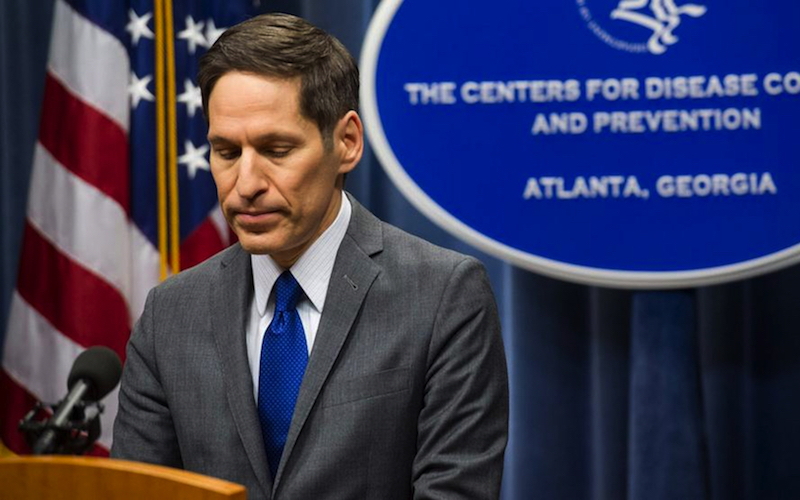
Lack of Courage and Common Sense are Ebola’s Greatest Ally
Unless someone in this country doesn’t understand English, read a newspaper or have regular conversations with others about what is happening in our country and/or the world, it is difficult to believe that any adult in the United States is unaware of the existence of, or dangers associated with, the Ebola virus. That being the case, how is it that any law maker or health care professional could fail to grasp the significance of the pandemic looming just around the corner? That is exactly what appears to be happening, two weeks after the death of Thomas Duncan, the first Ebola patient in the U.S.
The Obama administration has failed to either prohibit travel to the U.S. for individuals originating from Guinea, Liberia and Sierra Leone, or, in its absence, to require that any person arriving in the U.S. from these countries fly only to those airports currently set up to monitor the temperature of disembarking passengers. While anyone infected but not symptomatic will not exhibit a fever for up to 21 days, at least monitoring their temperature on arrival would allow authorities to isolate them immediately (though I do find myself wondering whether any of these airports have the equipment and number of people required to do so according to the Centers for Disease Control and World Health Organization protocol).
The Director of the CDC, Dr. Tom Frieden, and Dr. Anthony Fauci, Director of the National Institute for Allergy and Infectious Disease — the de facto public faces of the Obama administration in the media on the Ebola issue — have both come out strongly against closing these countries’ borders, stating that doing so would prevent U.S. authorities from effectively monitoring who arrives in the U.S. from there, and suggesting that political and economic chaos would be the net result in Guinea, Sierra Leone and Liberia.
Such an argument presumes that the Department of Homeland Security maintains a tight grip on U.S. borders, and that it effectively monitors the movements of those who do arrive — legally or illegally. Given the porous border with Mexico, that clearly is not the case, nor is it the case that the U.S. government actually has the ability to monitor the movements of every legal or illegal immigrant. If that were the case, it would presumably have been monitoring the movements of Mr. Duncan. It obviously was not.
A report recently published by the Customs and Border Patrol noted that between January and July of this year, more than 70 illegal immigrants had been detained from Guinea, Sierra Leone, and Liberia. So, even with unrestricted access to the U.S. from these countries, scores of individuals have already attempted to enter the country illegally. Contrary to the doctors’ contentions, my view is that closing those countries’ borders would reduce the number of attempted illegal entries, rather than increase it.
I would also like to know what makes medical doctors experts in political science or economics? These countries have, for many years, experienced some combination of political upheaval, civil war, endemic corruption, a failure to meet their citizens’ basic needs, and/or economic distress. Clearly, sealing their borders would exacerbate an already desperate situation — but that’s the point — it is already desperate. Whether their borders are sealed or not, they are and will remain, in dire straits. The countries that surround these countries have already sealed their borders. For the U.S. not to do so is the height of irresponsibility, degrades the actions neighboring countries have already taken, and helps exacerbate the problem.
The absence of the creation and effective implementation of stringent guidelines governing the interaction of health care workers who have treated an ebola patient with the general population borders on criminal, as does the lack of common sense on the part of the health care workers. Seriously — after all the time that has passed since the outbreak of the virus in West Africa earlier this year, why are guidelines for health care workers only being developed and distributed now?
Why wasn’t Amber Vinson, and all those who worked with her, told to stay at home and not go to public places after treating Mr. Duncan? Why didn’t Ms.Vinson have the common sense not to get on an airplane until the 21-day potential infection period had passed in the first place? Why did she not have the presence of mind not to get on another airplane after she developed a fever? Why did the health care worker who became ill on a cruise ship over the weekend also demonstrate such poor judgment in getting on that boat in the first place? Are people so focused on themselves that they stop thinking? And if the government cannot monitor these health care workers, how can it possibly be expected to monitor thousands of annual entrants to the U.S. from Guinea, Liberia, and Sierra Leone?
The combination of a failure to grasp the seriousness of the problem, a failure to provide strong leadership, and an absence of common sense are bound to make the ebola epidemic a pandemic. If the families and friends of infected individuals, and health care workers treating infected individuals, cannot exercise some common sense, there is nothing any government can do to effectively battle this dreaded disease.
But the battle must start with leadership that acknowledges the stakes at hand, with the courage and determination to do what is necessary. Not sealing the borders of those West African countries makes no sense. Not monitoring those individuals from the impacted countries who have entered this country since the outbreak began makes no sense. And not providing immediate funding to enhance our ability to battle this disease makes no sense.
This article was originally posted in The Huffington Post.

